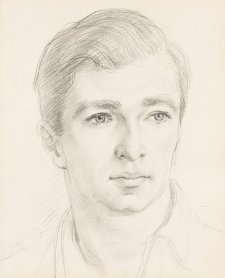Henry Baynton Somer ‘Jo’ Gullett AM MC (1914-1999), soldier, politician, ambassador, farmer and author, was the son of Sir Henry Gullett, who was one of the Australian official historians of the First World War. Born in London, Jo spent his youth at Hill Station in the ACT, later returning there on holidays from Geelong Grammar. He proceeded to the Sorbonne and Oxford. In 1939, he was working as a Herald journalist in Melbourne; almost as soon as war was declared, he enlisted in the second AIF. As an infantry sergeant at Bardia, Libya in 1941, he was wounded, but he returned to serve as an officer in the Greek campaign. He was awarded the Military Cross for his leadership and disregard of danger in New Guinea. In 1944, he was one of the few Australians to take part in D-Day operations at Normandy. As a company commander with the Royal Scots he was wounded again, and returned to Australia. Sir Henry Gullett had been killed in the Canberra plane crash in 1940. In 1946, like his father before him, Jo Gullett was elected the Member for Henty (a Victorian electorate, mostly held by conservatives and now abolished). A strident opponent of communism, Gullett described the influence of the Secretary of the Department of External Affairs, John Burton, as ‘almost wholly evil’; he vehemently criticised Doc Evatt; and he described the Australian National University as ‘more famous for its left wing politics than for its research’. In February 1947 he wrote in the Argus that ‘the arrival of additional Jews is nothing less than the beginning of a national tragedy and piece of the grossest deception of Parliament and the people by the Minister for Immigration’ [Arthur Calwell]. A flood of letters to the Argus, pro- and anti-Jewish immigration, ensued. In April the Hebrew Standard of Australasia ran an article querying ‘Who but Mr Gullet . . . could have the superb audacity, the supreme contempt for evidence, to assert that the Jews lack courage and determination . . .? Who else but Mr Gullett could show such whimsical disregard for reality as to assert that Australia has become the “dumping ground for Jewish migrants” when in fact of the 34 000 people who entered Australia in 1946, only 700 were Jews? . . . It is only fair to answer some of his traducers. To those who dub Mr Gullett a Nazi I say “You can’t prove it.” . . . It can be stated positively that he has never run a concentration camp or indulged himself in the pleasure of mass extermination. As to whether he is copying the more intellectual antisemitism of a Rosenberg, there is no positive proof that he has ever read the books of that great master, or indeed that he has ever read any books at all.’ Gullett was Chief Whip from 1950 to 1955, but was not favoured by Menzies and retired from politics after nine years. In 1946 he had bought Lambrigg, in the ACT, the property on which William Farrer had conducted his experiments on wheat, and from 1955 he concentrated on farming, although from 1965 to 1968 he was Australian Ambassador to Greece and a supporter of the anti-communist ‘colonels’ who had seized power. His account of his war experience, Not as Duty Only, was published in 1976 and was long required reading for prospective Army officers. His autobiography, Good Company, was published in the early 1990s.







